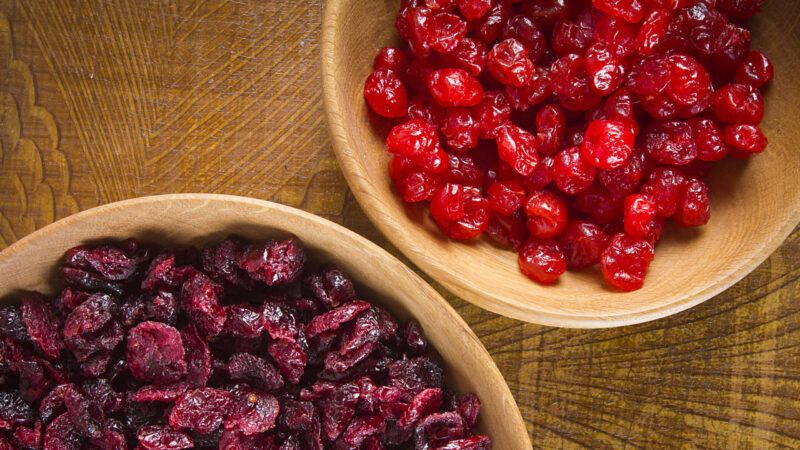Cherries Are 'Unhealthy,' Says the Same Government That Once Pushed Low-Fat Pop-Tarts
The FDA’s latest nutrition rules target dried cherries and cranberries, putting small farmers at risk while offering zero benefits to consumers.

The Food and Drug Administration (FDA) is currently revising its guidelines for nutritional content claims on food, including what products can use the term "healthy" on their packaging and marketing. Yes, the same government that came up with the food pyramid would still like to be seen as an authority on healthy eating.
A proposed rule from the FDA—expected to be finalized in the coming weeks—will likely declare that dried fruits like cranberries and cherries can no longer be labeled "healthy." If the agency indeed follows through, this could be one blight that small and independent orchard owners and fruit growers across the nation may not be able to weather.
The agency's proposed rule, announced all the way back in 2022, would prohibit dried tart cherries and cranberries from being called healthy if they contain added sugar. Given that these fruits make one pucker by their very nature, sugar is often added to make them more palatable—also doubling as a natural preservative. This additional sweetening does not inherently make them unhealthy, however. In fact, it merely equalizes them in terms of sugar content compared to more naturally sweet dried fruits, such as raisins (not to mention dried mangos, which are naturally loaded with sugar).
Cherries also contain antioxidants, in addition to being a source of fiber and Vitamins A and C, and research has suggested they can help with gout, arthritis, and heart health. Likewise, cranberries have been found to be helpful for everything from cardiovascular disease to urinary tract infections.
In states known for high levels of cherry and cranberry production, such as Michigan, Wisconsin, Utah, and Massachusetts, the ramifications of a no-longer-healthy declaration could be devastating. The Utah Tart Cherry Marketing Board has estimated that up to three-quarters of the tart cherry industry's sales could be impacted by a rule change.
The FDA has taken a curious line of defense against these claims. As The Washington Post noted, in the cost and benefits section of the proposed rule, the agency quietly tucks in the following statement: "We estimate that a small number (0 to 0.4 percent of people that try to follow current dietary guidelines) of these consumers would use the 'healthy' implied nutrient content claim to make meaningful, long-lasting food purchasing decisions."
In other words, while fruit growers think the rule will severely hurt them, the government says it essentially will have zero impact whatsoever. This begs the question: If both sides agree that this rule change isn't helping anyone, why change it all?
Further militating against government involvement in this issue is the fact that the federal government has a jaw-droppingly bad track record when it comes to dispensing nutritional guidance.
Perhaps most infamously, the government has declared a decades-long war against saturated fats, which has long since been thoroughly discredited. This still hasn't stopped the FDA in this latest rulemaking from continuing to recommend caps on saturated fat levels as part of what constitutes "healthy." As one 2022 academic paper deadpanned: "The current challenge is for this new consensus on saturated fats to be recognized by policy makers, who, in the United States, have shown marked resistance to the introduction of the new evidence."
Meanwhile, sugar-packed cereals like Honey Nut Cheerios are still allowed to proudly display health claims on their packaging, while salmon is barred from doing so on account of its fat content. The FDA is proposing changing the categorization of both these products—salmon would now be classified "healthy," sugar cereals "unhealthy"—but the fact that it is just now considering this change raises doubts about the agency's role as a dispenser of diet advice.
Some Greek yogurts with modest amounts of added sugar would be considered "healthy" under the FDA's new rules, but slightly sweetened cranberries would not. So arbitrary is the FDA's logic that it has attracted the attention of a bipartisan group of federal lawmakers—it's not every day you get Sens. Elizabeth Warren (D–Mass.), Ron Johnson (R–Wis.), and Mitt Romney (R–Utah) all on the same page—spurring them to pen a letter to the agency calling for a reconsideration of the "healthy" status of cherries and cranberries.
Incredibly, this isn't the first time the federal government has decided to insert itself in the geopolitical issue of cherry and cranberry regulation. In the early 2000s, the FDA sent threatening letters to cherry and cranberry growers who extolled even modest health benefits from the fruit. And it wasn't until just earlier this year that the FDA finally announced a cease-fire in its ludicrous half-century war against frozen cherry pies.
A government with a long history of giving bad nutritional advice shouldn't be deciding what counts as "healthy." This latest move against dried fruits is just another example of misguided overreach that could harm small farmers without real benefit to consumers.


Show Comments (61)